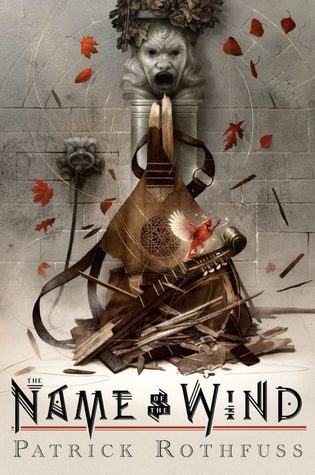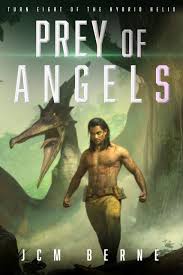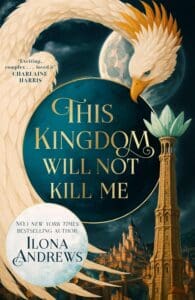
Synopsis
In seclusion, disguised as an innkeeper, Kote lives a quiet life with his companion Bast, until one day a chronicler shows up at their home. He had set out in search of the legendary Kvothe – and found him. Kote lets himself be persuaded and tells the chronicler his story. Kvothe is not a famous man without reason, numerous experiences and hard lessons have made him what he is today. But let us begin with the beginning.
Review
Some authors can make words come true. They paint language pictures on the walls of the reader’s mind and transport him – without him really noticing – into the world of the book. And Patrick Rothfuss is a master of his craft, because with a coherent and authentic narrative style he transports the reader into Kvothe’s story and manages not only to make it hard to put the book down, but also to make you feel part of this story. You sit in the inn with the storyteller himself and the chronicler and believe you only have to reach out your hand to touch it all. This eerily dense atmosphere make “The Name of the Wind” an absolute must-read for Heroic Fantasy fans and continue to have an effect for quite a while, so that one cannot escape the pull of this story.
“The best lies about me are the ones I told.”
Particularly noteworthy is the fact that the events of the story can in no way be described as nerve-wracking suspense – it is rather a life story told in retrospect and still playing into the present. Through so-called interludes, one is so skilfully brought back from the past to the present that one is always surprised at how deeply one could drift into this story without really noticing that it is actually all just a replay of events. The combination of the fluently readable writing style, the dense atmosphere and Kvothe’s experiences nevertheless have their effect – somehow you have to know what happens, what Kvothe continues to experience and how he became the man who tells this story. It is almost inevitable that you will keep turning the pages and keep going and eventually be left with thousands of questions without answers when the book ends.
“It's like everyone tells a story about themselves inside their own head. Always. All the time. That story makes you what you are. We build ourselves out of that story.”
You take the characters to your heart and begin to feel at home in the story. It’s a bit like coming home when you open the pages and find yourself in the library or the inn, and that’s also due to the characters – first and foremost, of course, the protagonist Kvothe, who can call not only many names but also many facets his own and is definitely not the typical hero of a fantasy epic. The reader gets to know him as a little boy and then accompanies him as a self-confident young man, whereby one can clearly follow his development, which never goes as one would wish for him. The fact that he occasionally acts overzealously and overestimates his opponents only makes him all the more likeable, as it shows that despite his great talents he has remained a down-to-earth person who lives and laughs, loves and mourns. You experience the world of the main character Kvothe not just over his shoulder, but directly from his heart. And there is a lot to feel there, such as sheltering security, boundless rage, agonizing pain, cloud-light languishing love, loyal cohesion, iron-hard willpower or irrepressible restlessness.
“All stories are true,” Skarpi said. “But this one really happened, if that’s what you mean.” He took another slow drink, then smiled again, his bright eyes dancing. “More or less. You have to be a bit of a liar to tell a story the right way. Too much truth confuses the facts. Too much honesty makes you sound insincere.”
This book touches not only the mind, but all organs of perception. I was touched by the descriptions of music and possible romances, of the lessons at the university or just the simple struggle of a boy to survive. I claim that it was only in this book that I got to know certain aspects of love that I was aware of but could never have described as such. Writing this review was probably one of the hardest tasks for me, because there are no words for Patrick Rohfuss’ novel that would even come close to describing what it is: an incredibly great novel.
Kvothe is now a part of me.
“It was the patient, cut-flower sound of a man who is waiting to die.”








Such a great review! Really love the book and can’t wait for the third one
thank you so much 🙂 Also can’t wait for the third !
I read a lot of books and most of them are classics because of the rich language. I loved this book. It was truly unique in its narrative style and descriptive language. Your review was perfect and now I want to read all your reviews so I can find more books to read as we seem to think a bit alike! I wish there were more like Rothfuss.
A Word of warning to anyone thinking of starting this.
Don’t be fooled by the epic new cover or the bombastic reviews. Or the overly postive rating
Seriously 10
I mean 9-9.5 at best.
While the reviews are for the most part true and the story is unforgettable.
I only have the following warning for u
Book 1. Name of Wind published 27 March 2007.
Book 2. Wise man’s Fear published 7 March 2011.
Book 3. Doors of Stone ?????
Who knows when and if it will come out.
So decide for yourself
If u would rather not start
Or be raving mad year after year waiting for it.
Spoken by someone who started this series in the year 2007.
Everyone has different opinions and likes different things. Your 9/10 is someone else’s 10/10 in this instance and that’s okay. Your opinion is not inherently better or more correct. Also, the slowness of the publishing for this series has no bearing on the quality of each individual book and its silly to insinuate that at all. Plenty of other series out there to enjoy until the rest of this series is published.